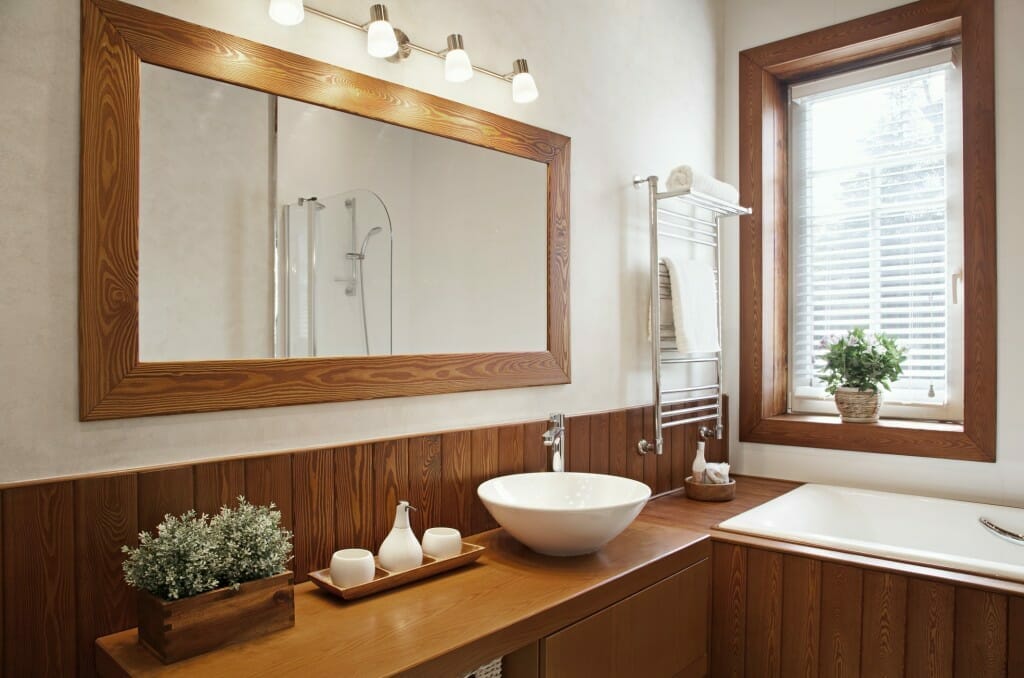Create the perfect pairing in your bathroom retreat with luxurious vanity and countertop combinations. By…
Guide to Selecting Bathroom Countertops

Granite, solid-surface, tile or quartz, which one should you choose? Industry insiders share the pros and cons of each surface to help you select the best countertop for your bathroom.
While functionality might be your number one factor in choosing a kitchen countertop, you can bump the term down a few notches when it comes to choosing countertops for your bathroom. Yes, functionality is important in the loo, too, but bathroom surfaces usually don't take the beating that kitchen countertops do (assuming you're not using the equivalent of serrated bread knives and marble rolling pins in the bathroom). This makes you free to consider appearance above all else. That's good news since bathroom countertops are generally custom-made, leaving the style and design options wide open to personal taste.
"You can have a different attitude in the bathroom," asserts Myron Ferguson, the author of Better Houses, Better Living, of countertop design. "Kitchen countertops have to be a whole lot more functional." Cultured marble, for instance, is lovely in the bathroom, but it wouldn't be durable enough for a kitchen.
Bathroom countertops can make a statement and still be practical, providing additional workspace. Choosing a particular material can set the tone of the room. Stainless-steel countertops are low maintenance and look fabulous in a contemporary bath, says Diane Foreman, a designer with the Neil Kelley Company in Portland, Ore. "If it's of good quality, it gets more beautiful with time," she adds. Glass can also be striking and modern, but it's a challenge to keep it free of fingerprints, and solid slabs can be pricey. One alternative is to use glass tiles.
Aside from appearance, one should also consider price, maintenance and compatibility when investing in a bathroom countertop. Following are four of the most popular surfaces worth investigating.
Granite
Long lasting, stain-resistant and beautiful, granite is the Rolls-Royce of countertops. Once the surface of choice for high-end bathrooms, granite is gaining in popularity for a broad spectrum of home styles. It is the most durable and easiest to care for of any of the natural stone materials, Diane says. While relatively expensive, it provides an elegant look that is incomparable. Tip: Tammy Crosby, CEO of thehousedesigners.com (https://www.thehousedesigners.com) suggests comparing prices at local stone shops. You'll save even more if you can use leftovers from another homeowner's project. Granite tiles are also more affordable than slabs.
Granite Maintenance: Granite countertops need to be sealed every six months to a year. Clean countertops with warm water and a liquid detergent. Avoid abrasive cleaners; they'll scratch and dull the finish. Small chips and scratches can be polished down.
Granite Cost: From $75 to $200 a linear foot, installed.
Manufactured Quartz
Manufactured quartz imitates the look of limestone, granite or marble, but is even more resistant to scratches and stains. Made up of 90 percent quartz particles, this synthetic composite comes in a wide variety of colors and thicknesses. In fact, four companies — Silestone, Okite, CaesarStone and DuPont's Zodiaq — make more than 130 manufactured quartz countertops. Tip: Quartz is the material to use if you're considering a countertop with a specialized edging, Tammy says.
Quartz Maintenance: Practical for the bathroom, quartz is durable, easy to clean and doesn't require sealing.
Quartz Cost: From $110 to $250 a linear foot, installed.
Tile
Tile has always been a popular material for bathroom countertops, but homeowners often complain about the need to clean the grout. These days, however, tiles are coming out in much larger sizes, which eliminate the need for numerous grout lines, says Sheila Tilander, a designer with Showplace Design and Remodeling in Redmond, Wash. Through-body (unglazed) porcelain tiles are stronger than granite and about a third of the price. Plus, the myriad types of ceramic and porcelain tiles, including ones that have a metallic look, allow for fabulous designs. Tiles also work well with other materials such as glass or concrete. Tip: Use a colored grout that doesn't show dirt as easily and which plays off the color of the tile. For a striking contrast, try a terra-cotta tile with a dark gray grout.
Tile Maintenance: Grout lines need regular maintenance and cleaning. The tiles can be easily cleaned with any household detergent.
Tile Cost: For plain-colored tiles, $2 to $40 per tile. For handpainted tiles, $5 to $75 per tile.
Solid-Surface Materials
Designed to look like natural stone, solid surface is one of the most popular countertop options available. Known by its brand names such as Corian, Staron, Gilbraltar and Avonite, this easy-to-maintain synthetic product can be molded to fit any design specification. Tip: Use a solid-surface material if you're concerned about mold or mildew. The nonporous, hypoallergenic surface discourages the growth of these allergens.
Solid-Surface Maintenance: Being nonporous, it's easy to clean.
Solid-Surface Cost: $75 to $150 a linear foot, installed.
(Source:HGTV)
Lock In Your $1500 Savings. Schedule Today.
Find A Location Near You













